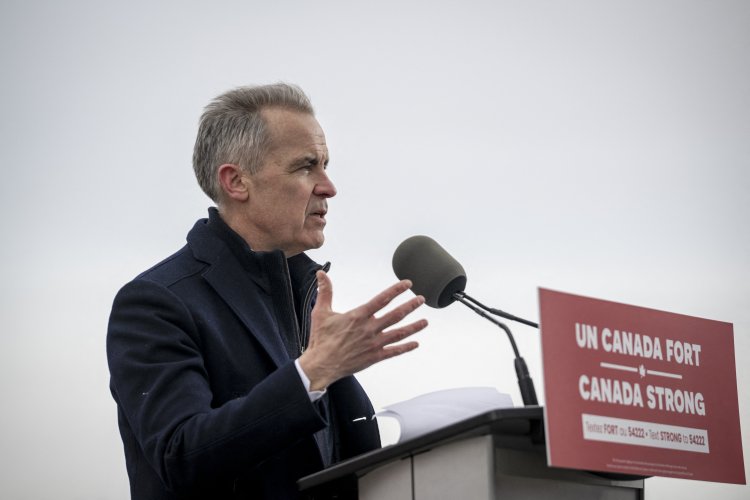Trump, Trade, and Tariffs: Shaping the Narrative of Canada's Election
OTTAWA — Donald Trump has set the stage for Canada's federal election, with the upcoming challenge being how candidates vying to be the next prime minister react to the president's "Liberation Day" tariffs. As a snap election unfolds amidst...

As a snap election unfolds amidst a trade dispute, Trump is anticipated to announce 25 percent tariffs on automobiles and implement reciprocal tariffs on Wednesday.
The looming threat to Canada makes the 2025 election potentially the most significant foreign-facing Canadian ballot since 1988, when the nation voted on a free trade agreement with the United States.
Mark Carney, who succeeded former Liberal Prime Minister Justin Trudeau on March 14, has already navigated a key obstacle: establishing a respectful initial contact with Trump without facing public ridicule. Meanwhile, since Trump's return to the White House, Conservative leader Pierre Poilievre has struggled with ties to his right-wing base and MAGA supporters.
Last Friday, Carney and Trump held their inaugural phone conversation, during which advisors recommended that the new leader refrain from an in-person White House visit to avoid a potentially damaging photo opportunity like that experienced by Ukrainian President Volodymyr Zelenskyy in February.
“I don't think it's in anybody's interest in Canada to get Zelenskyy-ed,” Flavio Volpe, president of the Automotive Parts Manufacturers’ Association of Canada, stated.
As the campaign enters its second week, Carney, Poilievre, and the nation brace themselves for the impending impact of Trump’s tariffs.
The next prime minister will serve as a political counterpoint to Trump at a critical moment when Canada’s economic future and autonomy are under threat. Canadians are acutely aware of this situation, responding with a surge of nationalist sentiment, boycotting American products and significantly reducing travel to the U.S.
“These are not ordinary times. We are facing the biggest crisis of our lifetime,” Carney remarked in Vaughan, Ontario, announcing plans to construct 500,000 affordable homes each year, drawing parallels to the post-World War II initiatives aimed at supporting returning Canadian veterans.
“As I made clear to the president in our call last week, I will reject all attempts to weaken Canada, to wear us down, to break us so that America can own us,” he reiterated—a sentiment he has consistently expressed since the campaign began.
In light of the resurgence of Trump’s auto tariffs, Carney paused his campaign to return to Ottawa for critical discussions with his Cabinet and Canada’s provincial leaders.
When Trump's tariffs materialize, Carney will again step away from the campaign to engage with Washington—a role that Poilievre can only aspire to at this time.
On the campaign trail, Poilievre frequently criticizes a “lost Liberal decade,” asserting that despite Carney's new leadership, he is not a true “change” candidate. Trump frequently taunted Trudeau during his final weeks in office, energizing Poilievre's base, over one-quarter of whom hold a favorable view of Trump, according to a recent poll.
“That, I think, explains why Donald Trump keeps endorsing Mark Carney. He keeps giving Carney support,” Poilievre asserted Tuesday in Newfoundland, adding that Liberal policies have made Canada’s economy “more weak and reliant on the Americans than ever.”
Earlier this year, Poilievre’s Conservatives enjoyed a double-digit lead in polls until Trudeau resigned and the Liberal Party elected Carney as leader.
On Monday, the candidates were faced with the latest evidence of the shifting political environment, highlighted by a major poll indicating that Liberals lead Conservatives by a 43.6-to-36.1 percent margin.
Veteran Conservative strategist Kory Teneycke commented on a podcast Monday that they might be facing the campaign's most pivotal week. “Tariffs are coming on Wednesday, and we've gotten some very mixed messages coming out of the Trump administration as to what that looks like,” he noted.
Teneycke also pointed out the “more positive comments coming from Trump after the call with Carney.” Canadian commentators spent the weekend analyzing the anticipated phone call between Carney and Trump.
Carney had stated he was unwilling to engage with Trump unless the president respected Canadian sovereignty, especially after months of labeling Trudeau as “governor” and suggesting Canada was the 51st state.
Following the call, Carney informed the media that although Canada would still contend with Trump’s tariffs, their conversation was constructive. “The president respected Canada's sovereignty today, both in his private and public comments,” Carney affirmed.
Trump later stated on Truth Social that he and Carney "agree on many things, and will be meeting immediately after Canada’s upcoming Election.”
Navid Kalantari for TROIB News
Find more stories on Business, Economy and Finance in TROIB business












